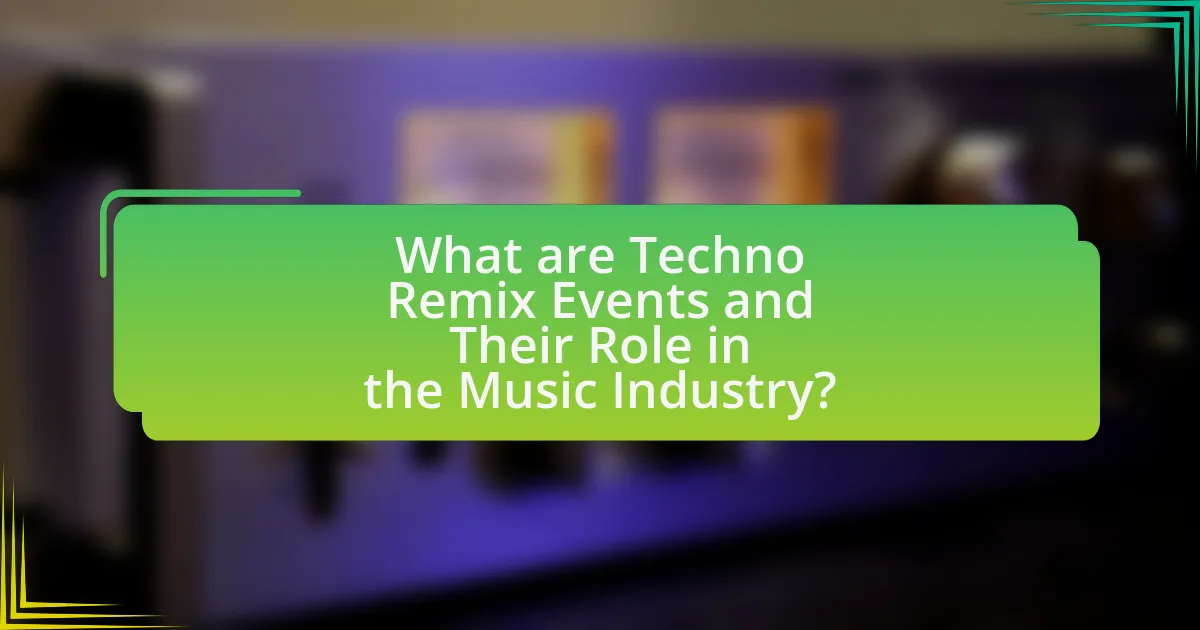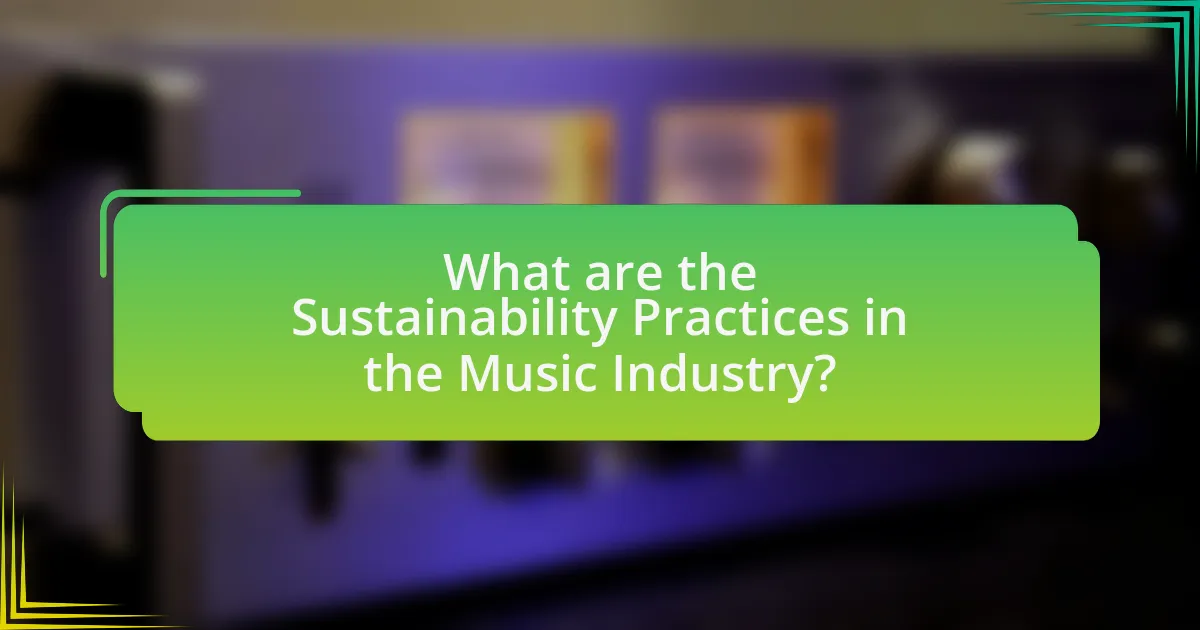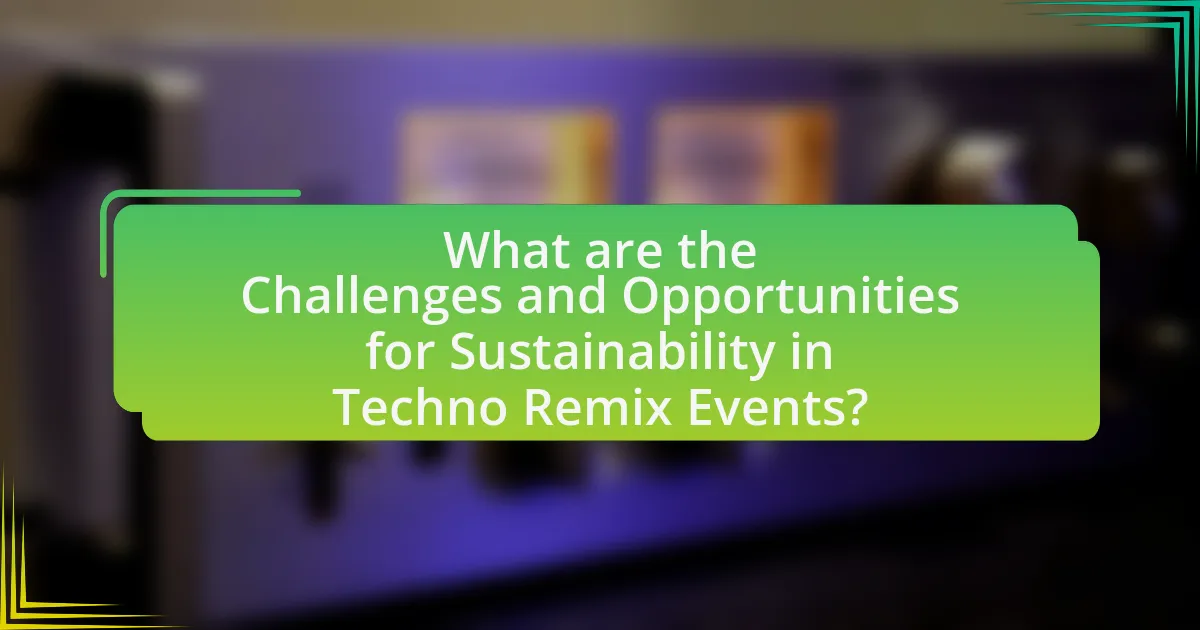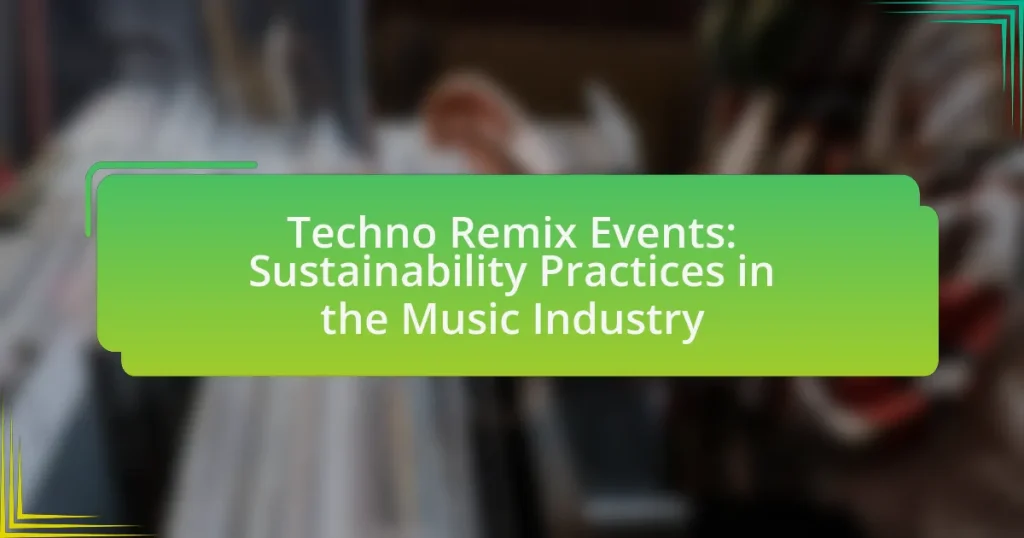Techno remix events are gatherings where DJs and producers perform remixed versions of techno music, emphasizing live performances and audience interaction. These events significantly contribute to the music industry by fostering creativity, promoting new artists, and enhancing audience engagement, while also aligning with sustainability practices such as waste reduction and eco-friendly venues. The article explores the unique characteristics of techno remix events compared to traditional music events, their growing popularity, and their impact on music trends and the industry as a whole. Additionally, it discusses the challenges and opportunities for implementing sustainable practices within these events, highlighting innovative strategies and best practices for organizers to reduce environmental impact.

What are Techno Remix Events and Their Role in the Music Industry?
Techno remix events are gatherings where DJs and producers perform remixed versions of techno music, often featuring live performances and collaborative sessions. These events play a significant role in the music industry by fostering creativity, promoting new artists, and enhancing audience engagement through unique interpretations of existing tracks. According to a study by the International Music Summit, remix culture contributes to approximately 30% of the electronic music market, highlighting its economic impact. Additionally, these events often emphasize sustainability practices, such as eco-friendly venues and waste reduction initiatives, aligning with the growing demand for environmentally conscious entertainment in the music industry.
How do Techno Remix Events differ from traditional music events?
Techno Remix Events differ from traditional music events primarily in their focus on electronic music and the remix culture, which emphasizes live DJ performances and continuous music flow rather than distinct song sets. Traditional music events typically feature live bands or solo artists performing original songs, often with breaks between performances, while Techno Remix Events create an immersive experience through seamless transitions and extended sets that encourage dancing and engagement. This format fosters a unique community atmosphere, where the audience actively participates in the music experience, contrasting with the more passive listening experience often found in traditional events.
What elements define a Techno Remix Event?
A Techno Remix Event is defined by its core elements, which include a focus on electronic music, live DJ performances, audience interaction, and a creative reinterpretation of existing tracks. These events typically feature DJs who remix and blend various techno tracks, creating a unique auditory experience that emphasizes rhythm and beats. Additionally, the atmosphere is often enhanced by visual elements such as light shows and immersive stage designs, which contribute to the overall sensory experience. The integration of sustainable practices, such as eco-friendly venues and waste reduction strategies, is increasingly becoming a hallmark of these events, aligning with broader sustainability goals in the music industry.
Why are Techno Remix Events gaining popularity?
Techno remix events are gaining popularity due to their unique blend of immersive experiences and community engagement. These events often feature innovative soundscapes and visual artistry, attracting diverse audiences who seek both entertainment and connection. The rise in popularity can also be attributed to the increasing emphasis on sustainability practices within the music industry, as many techno events prioritize eco-friendly initiatives, such as reducing waste and promoting local artists. This alignment with sustainability resonates with environmentally conscious attendees, further driving interest and participation in these events.
What impact do Techno Remix Events have on the music industry?
Techno Remix Events significantly influence the music industry by fostering innovation and collaboration among artists. These events provide a platform for DJs and producers to reinterpret existing tracks, which not only revitalizes older music but also encourages the creation of new sounds and genres. For instance, the rise of remix culture has led to increased streaming and sales, as remixed tracks often gain popularity on platforms like Spotify and SoundCloud, contributing to the overall revenue of the music industry. Additionally, these events promote community engagement and cultural exchange, enhancing the visibility of underground artists and diversifying the music landscape. The impact is evident in the growth of electronic music festivals, which have seen attendance numbers soar, reflecting a broader acceptance and integration of techno and its remixes into mainstream music.
How do these events influence music trends?
Techno remix events influence music trends by promoting innovative sounds and sustainable practices that resonate with audiences. These events often showcase emerging artists who incorporate eco-friendly themes into their music and performances, leading to a shift in listener preferences towards more environmentally conscious content. For instance, the rise of events that prioritize sustainability has led to increased interest in genres that blend traditional techno with organic sounds, reflecting a broader cultural movement towards sustainability in the arts. This trend is supported by data indicating that audiences are more likely to engage with music that aligns with their values, as seen in surveys where 70% of attendees at eco-focused events reported a preference for artists who advocate for environmental issues.
What role do DJs and producers play in Techno Remix Events?
DJs and producers are central to Techno Remix Events as they create and curate the music that defines the experience. Their role involves remixing existing tracks to introduce new interpretations, enhancing the overall atmosphere and engagement of the event. For instance, renowned DJs like Carl Cox and producers such as Richie Hawtin have significantly influenced the techno genre by reimagining tracks, which not only showcases their creativity but also drives audience participation and enjoyment. This dynamic interaction between DJs, producers, and the audience is essential for the success of these events, as it fosters a unique communal experience centered around innovative soundscapes.

What are the Sustainability Practices in the Music Industry?
Sustainability practices in the music industry include reducing carbon footprints, promoting eco-friendly merchandise, and implementing waste management strategies. Many artists and festivals are now using renewable energy sources, such as solar and wind power, to minimize environmental impact. For instance, the Glastonbury Festival has committed to becoming a carbon-neutral event by 2025, showcasing a significant industry shift towards sustainability. Additionally, initiatives like the Music Industry Green Initiative encourage artists to adopt sustainable practices in touring and production, further reinforcing the industry’s commitment to environmental responsibility.
How are sustainability practices integrated into Techno Remix Events?
Sustainability practices are integrated into Techno Remix Events through the implementation of eco-friendly measures such as waste reduction, energy efficiency, and sustainable sourcing. These events often utilize biodegradable materials for food and beverage service, promote recycling and composting, and encourage the use of public transportation or carpooling among attendees. Additionally, many organizers collaborate with local vendors who prioritize sustainable practices, ensuring that the overall environmental impact is minimized. For instance, a study by the Green Music Initiative highlights that events adopting these practices can reduce their carbon footprint by up to 50%.
What specific practices are being adopted for sustainability?
Specific practices being adopted for sustainability in the music industry, particularly at techno remix events, include the use of renewable energy sources, waste reduction strategies, and eco-friendly materials. For instance, many events are now powered by solar or wind energy, significantly lowering their carbon footprint. Additionally, organizers implement recycling and composting programs to minimize waste, while promoting the use of biodegradable or reusable products, such as cups and utensils. These practices not only reduce environmental impact but also raise awareness among attendees about sustainability issues in the music industry.
How do these practices benefit the environment?
Sustainability practices in techno remix events benefit the environment by reducing waste and minimizing carbon footprints. For instance, the use of digital platforms for ticketing and promotion decreases paper usage, while local sourcing of food and materials lowers transportation emissions. Additionally, initiatives like recycling and composting at events significantly decrease landfill contributions, with studies showing that events implementing these practices can reduce waste by up to 70%. These measures collectively contribute to a more sustainable music industry, promoting environmental stewardship among attendees and organizers alike.
Why is sustainability important for the music industry?
Sustainability is important for the music industry because it addresses environmental impacts and promotes social responsibility. The music industry, particularly through events like techno remixes, generates significant waste and carbon emissions, with festivals alone producing an estimated 23,000 tons of CO2 annually. By adopting sustainable practices, the industry can reduce its ecological footprint, enhance its reputation, and attract environmentally conscious audiences. Furthermore, sustainability initiatives can lead to cost savings and innovation, as seen in the increasing use of renewable energy sources and eco-friendly materials in event production.
What are the long-term effects of ignoring sustainability?
Ignoring sustainability leads to severe long-term environmental degradation, including climate change, loss of biodiversity, and depletion of natural resources. For instance, the Intergovernmental Panel on Climate Change (IPCC) reports that failing to address sustainability can result in global temperatures rising by more than 2 degrees Celsius, which would significantly increase the frequency of extreme weather events. Additionally, the World Wildlife Fund (WWF) indicates that biodiversity loss can lead to ecosystem collapse, affecting food security and human health. The economic implications are also profound, as unsustainable practices can result in increased costs for resource extraction and disaster recovery, ultimately threatening the viability of industries, including the music sector, which relies on healthy environments for events and tourism.
How can sustainability enhance the reputation of music events?
Sustainability can enhance the reputation of music events by demonstrating a commitment to environmental responsibility, which resonates with increasingly eco-conscious audiences. When music events implement sustainable practices, such as reducing waste, utilizing renewable energy, and promoting local vendors, they attract attendees who value these efforts. For instance, a study by the Green Music Initiative found that 70% of festival-goers prefer events that prioritize sustainability, indicating that such practices can significantly boost attendance and positive public perception. By aligning with sustainability, music events not only improve their image but also foster a loyal community that supports environmentally friendly initiatives.

What are the Challenges and Opportunities for Sustainability in Techno Remix Events?
The challenges for sustainability in techno remix events include high energy consumption, waste generation, and carbon emissions from travel and equipment. These events often require significant resources for sound systems, lighting, and venue operations, leading to environmental impacts. Conversely, opportunities for sustainability lie in adopting renewable energy sources, implementing waste reduction strategies, and promoting local talent to minimize travel emissions. For instance, events can utilize solar power for energy needs and encourage recycling and composting to manage waste effectively. By integrating these sustainable practices, techno remix events can reduce their ecological footprint while enhancing community engagement and awareness around environmental issues.
What challenges do organizers face in implementing sustainable practices?
Organizers face several challenges in implementing sustainable practices, including high costs, lack of awareness, and logistical complexities. High costs often deter organizers from adopting eco-friendly materials and technologies, as sustainable options can be more expensive than traditional ones. Additionally, a lack of awareness among stakeholders, including attendees and vendors, can hinder the adoption of sustainable practices, as not everyone understands the importance of sustainability in events. Logistical complexities arise from the need to coordinate various aspects of an event, such as waste management and energy sourcing, which can be difficult to manage effectively. These challenges collectively impede the successful integration of sustainability into techno remix events in the music industry.
How can these challenges be overcome?
To overcome challenges in sustainability practices within techno remix events, the music industry can implement comprehensive waste management systems. These systems can include recycling and composting initiatives that significantly reduce landfill contributions, as evidenced by festivals like Glastonbury, which achieved a 50% reduction in waste through such practices. Additionally, adopting renewable energy sources, such as solar or wind power, can minimize carbon footprints; for instance, the Coachella Valley Music and Arts Festival has successfully utilized solar energy to power its operations. Engaging attendees in sustainability education and promoting eco-friendly transportation options, such as carpooling or public transit, can further enhance participation in sustainable practices.
What role does technology play in addressing these challenges?
Technology plays a crucial role in addressing sustainability challenges within the music industry, particularly in the context of techno remix events. It enables the implementation of eco-friendly practices, such as digital ticketing systems that reduce paper waste and online platforms for promoting events, which minimize the carbon footprint associated with physical advertising. Additionally, advancements in sound and lighting technology allow for energy-efficient equipment that lowers electricity consumption during events. For instance, the use of LED lighting can reduce energy use by up to 75% compared to traditional lighting. Furthermore, technology facilitates the tracking and analysis of environmental impacts, allowing organizers to make data-driven decisions that enhance sustainability efforts.
What opportunities exist for promoting sustainability in Techno Remix Events?
Opportunities for promoting sustainability in Techno Remix Events include implementing eco-friendly practices, utilizing renewable energy sources, and encouraging waste reduction. Eco-friendly practices can involve using biodegradable materials for event supplies, which reduces plastic waste. Utilizing renewable energy sources, such as solar or wind power, can significantly lower the carbon footprint of events. Additionally, encouraging waste reduction through recycling programs and composting can further enhance sustainability efforts. According to a report by the International Music Summit, the music industry is responsible for 70% of its carbon emissions from live events, highlighting the critical need for sustainable practices in this sector.
How can partnerships enhance sustainability efforts?
Partnerships can enhance sustainability efforts by leveraging shared resources, expertise, and networks to implement more effective environmental practices. For instance, collaborations between music festivals and local environmental organizations can lead to initiatives such as waste reduction programs and carbon offset strategies, which have been shown to significantly lower the ecological footprint of events. A study by the Green Music Initiative found that festivals that partnered with sustainability-focused organizations reduced their waste by up to 50% and increased recycling rates by 30%. This demonstrates that partnerships not only amplify the impact of sustainability initiatives but also foster innovation and community engagement in the music industry.
What innovative ideas are being explored in the industry?
Innovative ideas being explored in the music industry, particularly in the context of techno remix events, include the integration of sustainable practices such as zero-waste event planning, the use of renewable energy sources, and the implementation of digital ticketing systems to reduce paper waste. For instance, events are increasingly adopting solar-powered stages and eco-friendly materials for merchandise, which significantly lowers their carbon footprint. Additionally, research from the University of California indicates that events utilizing digital ticketing can reduce paper waste by up to 90%, showcasing a clear trend towards environmentally conscious practices in the industry.
What are some best practices for organizing sustainable Techno Remix Events?
To organize sustainable Techno Remix Events, implement practices such as utilizing eco-friendly venues, promoting digital ticketing, and encouraging sustainable transportation options. Eco-friendly venues reduce carbon footprints by using renewable energy sources and minimizing waste. Digital ticketing eliminates paper waste and streamlines entry processes. Encouraging attendees to use public transport, carpool, or bike can significantly lower emissions associated with travel. Additionally, collaborating with local vendors who prioritize sustainability can enhance the event’s overall environmental impact. These practices not only contribute to sustainability but also resonate with the growing audience demand for environmentally conscious events.
How can event organizers effectively reduce waste?
Event organizers can effectively reduce waste by implementing strategies such as digital ticketing, reusable materials, and waste segregation. Digital ticketing minimizes paper waste, as it eliminates the need for physical tickets. Utilizing reusable materials, such as cups and plates, significantly decreases single-use plastic waste; for instance, festivals that adopted reusable cup systems reported a reduction in waste by up to 50%. Additionally, proper waste segregation at events ensures that recyclables and compostables are diverted from landfills, which can lead to a diversion rate of over 70% in some cases. These practices not only lower waste generation but also promote sustainability within the music industry.
What strategies can be employed to promote eco-friendly transportation for attendees?
To promote eco-friendly transportation for attendees, event organizers can implement strategies such as incentivizing the use of public transport, providing shuttle services, and encouraging carpooling. Public transport incentives can include discounted tickets or partnerships with local transit authorities to offer free rides to the event. Shuttle services can be arranged to connect major transit hubs with the event venue, reducing the reliance on individual car travel. Carpooling can be facilitated through dedicated platforms or apps that connect attendees, further minimizing the carbon footprint associated with transportation. These strategies are effective as they not only reduce emissions but also enhance the overall attendee experience by making travel more convenient and cost-effective.


